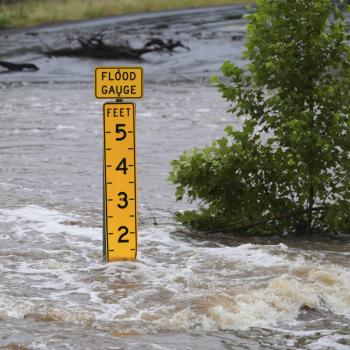Photo by Clay Banks on Unsplash
Trinity Sunday. Every year the liturgical calendar gives preachers the opportunity to lose their congregations, bore them to death, and lead them into heresy, leaving them with the conviction that the whole thing is irrelevant to daily life.
And that’s a bad thing. Because the God of Christianity is triune. How did the church arrive at that conclusion?
Big picture: In one way the early church was thoroughly Jewish. The first Christians believed that there is one God. They believed that God was creator. And they believed that God had led the children of Israel out of Egypt. Blessing them with a relationship that God offered them in terms of a covenant: I will be your God. You will be my people.
The early church also shared the Jewish conviction that God would one day send a messiah – a deliverer – who would create a set of circumstances that made their experience of that relationship complete. It would no longer be disrupted by their own failure and sins. It would no longer be disrupted by invasion and exile. And, back of it all, it would no longer be haunted by death, which seemed to put the lie to both God’s claim to be creator and his offer of an enduring relationship.
But that was where things took a different turn for the band of twelve Jews who followed Jesus. For centuries, Jews had entertained competing views of what that messiah would be like. Some of them believed he would be a king and conqueror. That he would restore the glory of Israel and put an end to the cycle of invasion and exile. Others believed that they would need to wait for the end of history.
But Jesus taught something entirely different. He showed no interest in the politics of either Israel or Rome. He declared that the Kingdom of God had arrived and that it was not of this world. But, more importantly, he also made it clear that he was not just God’s deliverer but one with God himself. And, in the wake of his Resurrection, he taught the disciples that the Holy Spirit would be given to them, not just as some ephemeral notion of God’s presence, but as yet another revelation of God’s being.
To be taught this by a Jewish messiah, speaking to the hearts and minds of devout Jews, could only mean one thing: that God was a trinity of three persons. The disciples already knew the God of Israel as creator and covenant-giver. Now they had experienced that God as messiah and deliverer. With the ascension of Jesus, they experienced the presence of the Holy Spirit. And, yet, together those experiences were of the one, the same, the only God.
In an important sense, then, the whole of the New Testament is about the efforts of the early church to come to grips with this reality. It was this conviction that drove them out into the wider world, and it shaped what they taught and how they lived.
That is why the Trinity figures so prominently in the conclusion of Paul’s second letter to the Corinthians:
Finally, brothers and sisters, rejoice. Be restored. Be encouraged. Set your mind on the same thing. Be at peace. And the love of God and peace will be with you. Greet one another with a holy kiss. All the saints greet you.
The grace of the Lord Jesus Christ, the love of God, and the fellowship of the Holy Spirit be with you all.[i]
What is going on here?
First, a bit of background to this passage: Paul spent a lot of time writing to the church in Corinth before he ever traveled there. And he spent a lot of time with them when he finally visited. They were, if you will, the problem children of Paul’s missionary efforts.
There were a number of reasons for this. But the two dynamics that made life in the church at Corinth a mess were a good deal of sexual perversion and a lot of heresy. This was thanks in no small part to Corinth’s standing as a leading port-city in the Roman Empire. So, think Amsterdam, New Orleans, or San Francisco – only on the Mediterranean.
Over the course of his letter to the Corinthians, Paul deals at length with these issues and others. But at the end of his letter what he is trying to do is to distill the heart of what he has been telling them into a handful of must-do’s:
One, rejoice. Be joyful. Celebrate. I know I’ve been really hard on you (and necessarily so), but God is doing a great thing and you’ve been called to participate in it.
Two, be restored. Your lives can be different. You can be healed. Not just as individuals but as the body of Christ.
Three, be encouraged. Take heart. Your behavior has not put you beyond God’s reach. God loves you.
Four, set your mind on the same thing. You may differ on minor issues, Paul is saying, but you should all share the same commitment to the essentials of the Christian journey. You cannot be spiritual alone or divided.
Five, be at peace. Life’s circumstances may change and they may be challenging but center your life on the work that God is doing among you.
The rest of what Paul has to say may sound to us like throw-away lines – so much verbal wallpaper. But it is not.
He urges them to share the kiss of peace – which symbolized the healing of their relationships with one another. This wasn’t a romantic kiss and it wasn’t a kiss on the lips. It was probably more like kiss of middle easterners when they greet another. You embrace and you kiss one another on the cheek. You can’t do – or, at least, you shouldn’t – unless you have reconciled with one another.
And Paul believes that this kind of relationship isn’t possible unless their relationship with God had been healed. The one flows from the other. And every other of kind of healing is fragile, imagined, or inauthentic.
He also reminds them in the sentence that follows that this isn’t just possible with one another but it is shared with the larger church, whom Paul writes, greets them as well.
But all of what he has said is only possible because of the blessing of “the grace of the Lord Jesus Christ, the love of God, and the fellowship of the Holy Spirit”. Devout Jew, one-time persecutor of the church, Paul had concluded that the program of ultimate healing that Jesus had launched with the inauguration of the Kingdom of God was the work of the triune God. And that God is three in one. The ultimate expression of oneness, of intimacy, and love. The work of the God who created the universe and all that is in it. Who reached out in love to create men and women who share in the Triune God’s capacity for the same love. Who, in spite of all obstacles, including our own willfulness provided a self-sacrificial path out of the hell we have created for ourselves, and welcomes us into his life, worked out in the life of the body of his Son, which is the church.
This means that the Trinity is as relevant as any truth about God and life can be.
If you thought that all God is interested in is getting your name moved from the column, “Damned and going to hell” to “saved and going to heaven”, you are wrong. If you think that all God is interested in is getting you to be a nice person – whatever that means – you are wrong. If you thought that going to church is just about supporting one more charitable institution among charitable institutions, and you thought that you could be spiritual all by your lonesome, you are wrong. Life in the body of Christ is participation in God’s on-going effort to make our lives with him and with one another, look like the life of the Trinity. The perfect balance of love and truth, grace and judgment.
If you don’t believe in God, you are also wrong. Not less loved of God. Not so much cannon fodder. But completely deluded and just as exposed to emptiness as someone who walks away from the offer of love perfected. That is a vacuum that cannot be filled with “the” science, with politics, with the effort to end hunger, or save the world from climate change. Because none of these things, however important they might be, speak in an adequate fashion to the loving nature of the Triune God, whose will for us transcends millennia and our narrow, fragmented visions of what humanity needs most. From before and after time, from a place we cannot imagine, out of an abundance of wisdom, truth, love and grace, the Triune God speaks to us in the way that an adult speaks to a two-year old who has yet to grasp anything that lies beyond the demand that the world meet his needs.
And for those of us who do believe and have glimpsed the glory of the Triune God, we have much yet to learn. Much to learn about the mystery of the Triune God’s life, whose way of being lies beyond our ability to grasp it completely or perfectly. Even more to learn about the nature of that life: God’s capacity for love, mercy, and understanding. Much to learn about God’s life-giving creativity, of which our efforts are a feeble imitation.
But it is the glory of that life that the triune God longs to share with us. It is into that glory that we venture every Sunday, as we consume his life. It is the promise of that glory on which we depend. And it is the promise of that life which should fill every moment of our lives until we breathe our last.
As St. Gertrude of Hilfta put it:
May I breathe my last breath in the protection of your close embrace, with your all-powerful kiss. May my soul find herself without delay there where you are whom no place circumscribes, invisible, living and exulting in the full flowering of eternity with the Father and the Holy Spirit, true God, everlasting , world without end. Amen.
[i] The elaborations are mine but thanks to Paul Barnett for the basic language of most of this translation. See his commentary on The Second Epistle to the Corinthians, The New International Commentary on the New Testament, Gordon Fee, ed. (Grand Rapids: Wm. B. Eerdmans Publishing Company, 1997): 614ff.














